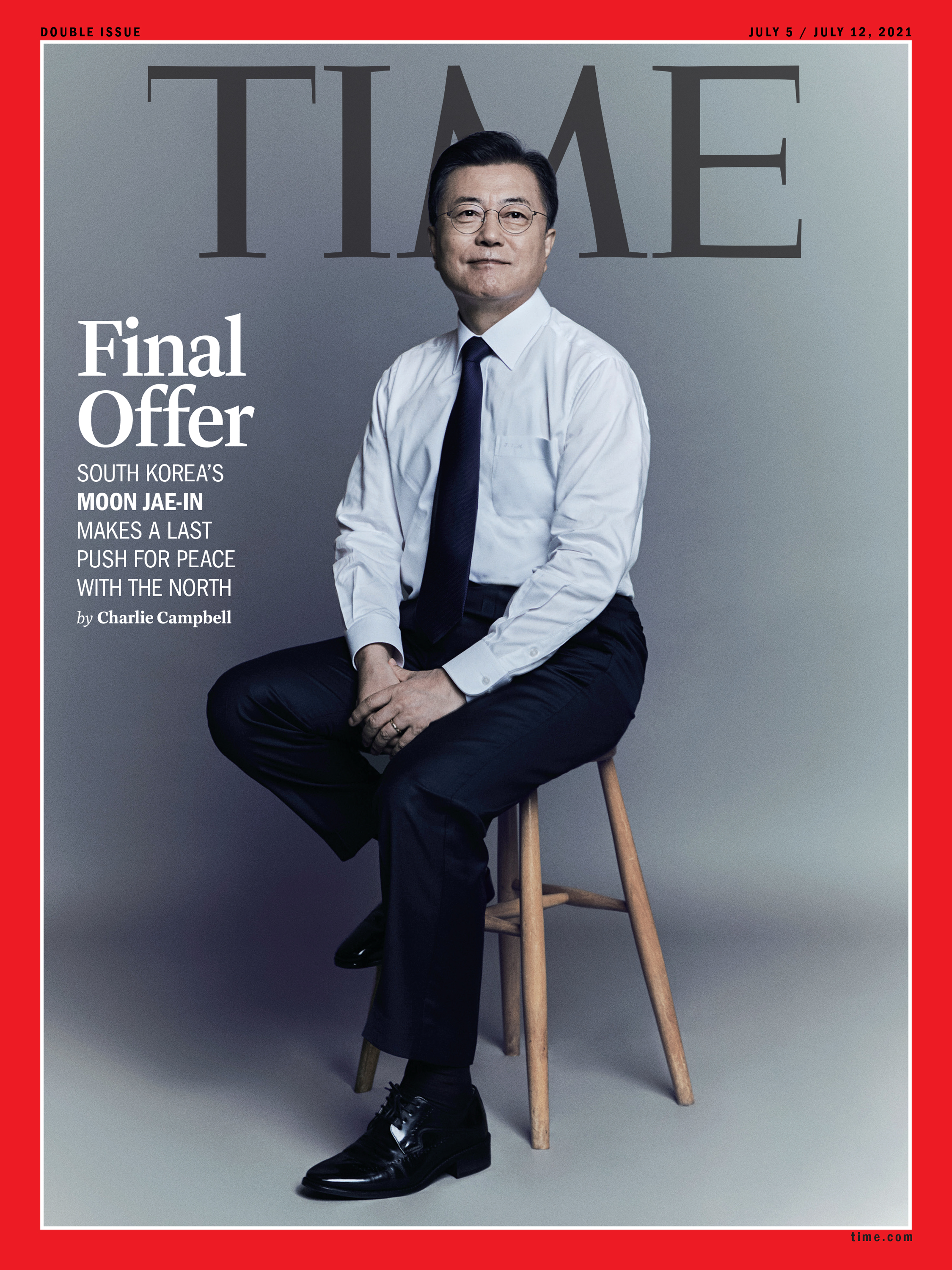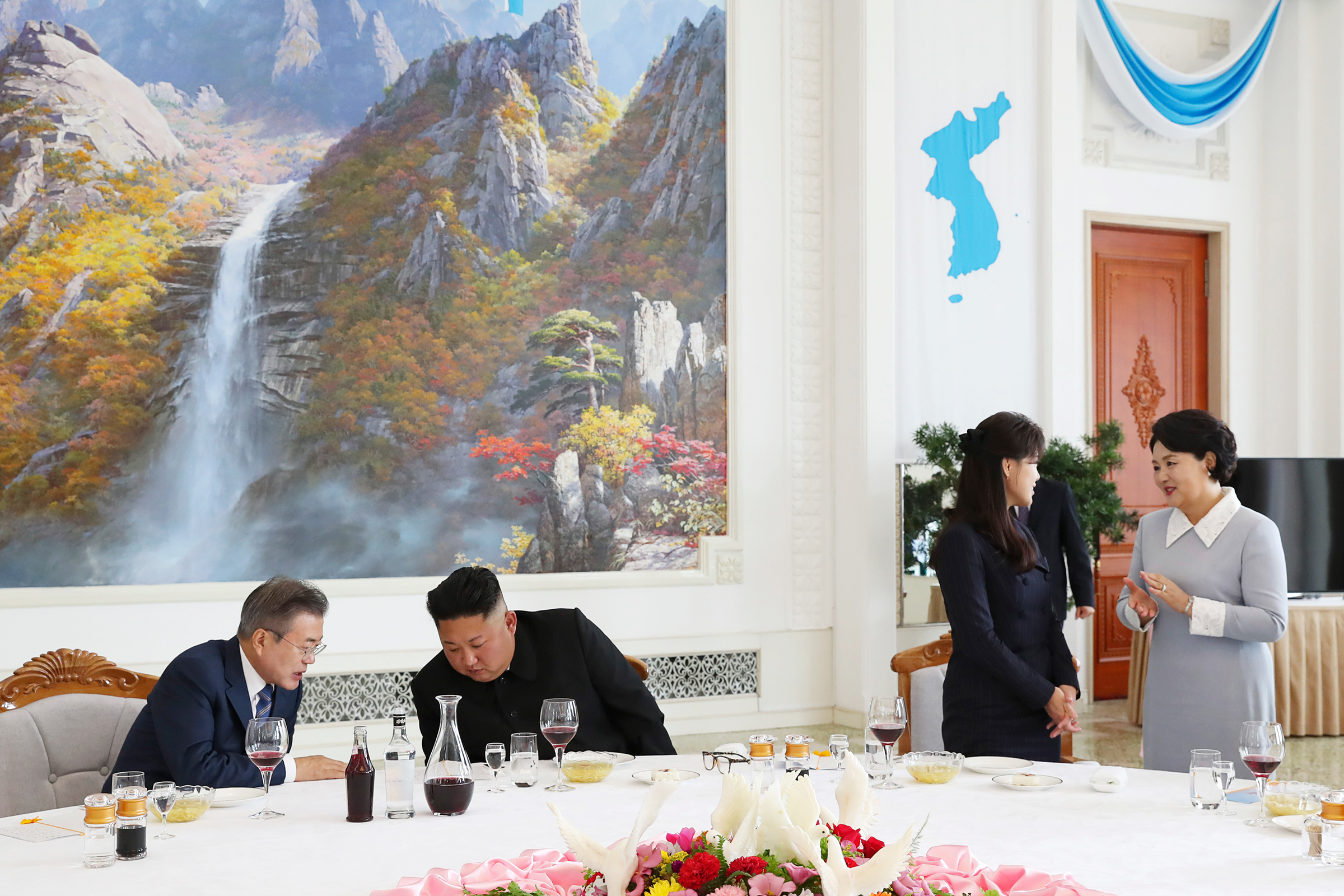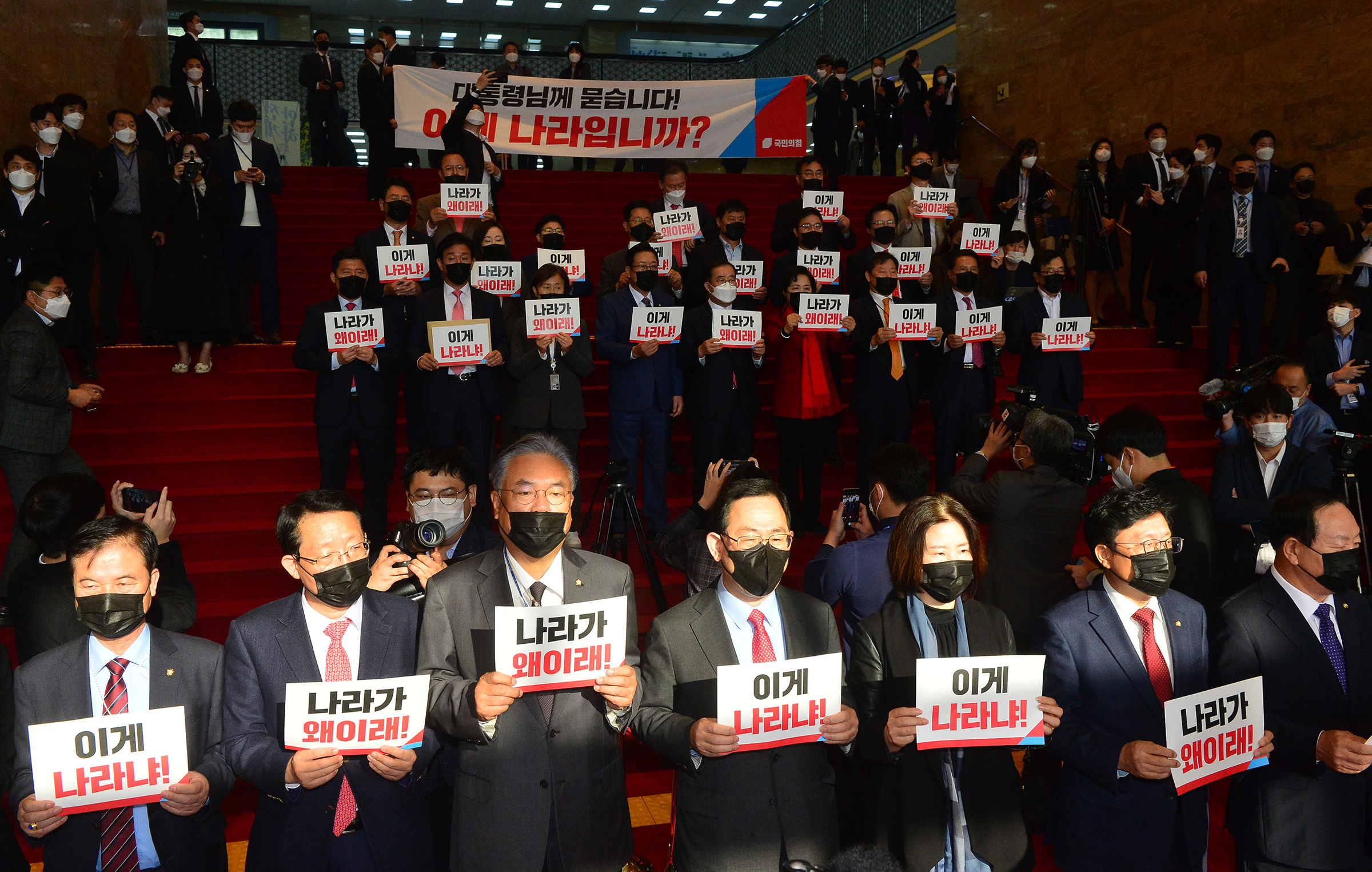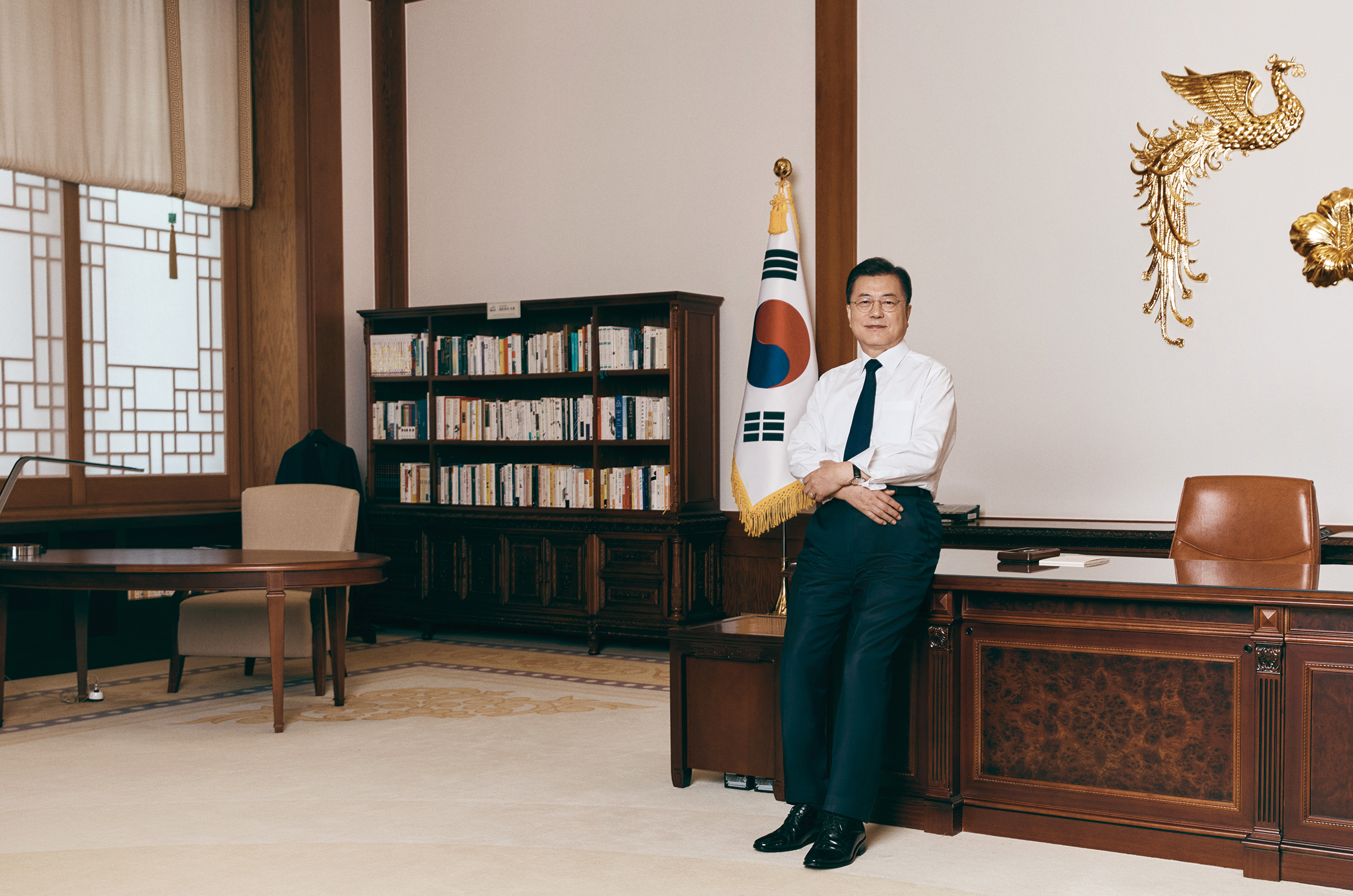Moon Jae-in can still hear the roar today. South Korea’s President had been seated next to Kim Jong Un in Pyongyang’s May Day Stadium on Sept. 19, 2018, for the close of the Mass Games when North Korea’s leader beckoned him up to the dais. Beneath a vast collage calling for Korea to “unite the strength of the entire people,” Moon urged the 150,000-strong crowd to “hasten a future of common prosperity and reunification,” while revelers brandished white flags with powder blue outlines of a unified Korean Peninsula. For Moon, it was a transformative experience. The North Koreans’ “eyes and attitudes” showed that they “strongly aspire for peace,” he tells TIME. “I could see for myself that North Korea has completely changed … and is doing everything possible to develop.”
That speech was the first by a South Korean leader in North Korea and the high point of a long, often agonizing process of engagement that Moon had charted since his election in May 2017. Odds were strongly against him at the outset: Moon’s arrival into Seoul’s presidential Blue House was bookmarked by North Korean weapons tests, including three long-range intercontinental ballistic missiles (ICBMs) and a purported hydrogen bomb, prompting then U.S. President Donald Trump to dispatch a U.S. Navy carrier group and threaten “little rocket man” with “fire and fury” in riposte. There had been no official dialogue between North and South since 2013, and caught between an irascible dictator and a geo-political neophyte, Moon feared the worst: “We were actually on the brink of war.”
Moon helped guide the world back from the abyss. Reconciliation kicked off with Kim agreeing to Moon’s invitation to send a delegation to the 2018 Winter Olympics in Pyeongchang. Soon after, Kim and Moon met at the Korean demilitarized zone that has separated its communist North from its capitalist South since an armistice effectively ended the 1950–53 Korean War. Over an 18-month period, diplomacy ramped up with astonishing speed: Kim held three summits with Moon, five with Chinese President Xi Jinping, one with Russian President Vladimir Putin and three with Trump. Kim even gifted Moon a pair of snow white Pungsan hunting dogs—Gomi and Songgang—to symbolize their flourishing accord. Following a historic summit with Kim in Singapore in 2018, the first between the leaders of these existential foes, Trump declared: “We fell in love.”

Get a print of TIME’s cover of Moon Jae-in here
Then things fell apart. A follow-up summit in Hanoi in February 2019 ended without progress. Key issues papered over by Trump in Singapore, like what vague terms like denuclearization actually meant, returned to the fore. Trump was fixated on the congressional testimony of his former lawyer Michael Cohen, taking place back in Washington. The U.S.–South Korea alliance was in trouble too, with Trump reportedly demanding a fivefold increase on the roughly $1 billion that Seoul contributes annually to hosting 28,500 U.S. troops. In June 2020, North Korea blew up a joint liaison office near the border town of Kaesong. Nine months later, it resumed solid-fuel, short-range missile tests. In January, Kim told the Workers’ Party congress that the U.S. was the “biggest obstacle for our revolution and our biggest enemy … no matter who is in power.”
Moon traveled to Washington in May to attempt to persuade the new occupant of the White House to re-energize a stalled peace process. South Korea elects a new President in March, and since Moon is ineligible to serve more than one term, he knows that time is running out to heal his riven homeland.
The divide has stayed much the same since the civil war: North Korea and China on one side; the U.S., South Korea and their allies on the other. Kim says he’s not giving up anything until there are unilateral concessions like relief from the U.N., U.S. and E.U. sanctions that restrict the export of coal, minerals, seafood and other cash-cow goods, which is a nonstarter for Joe Biden. The pandemic and deteriorating Sino-U.S. relations have complicated an already thorny picture. Biden has more urgent issues crowding his in tray: the pandemic, global warming and, crucially, China’s rise.
North Korea may not rank as urgent, but it is a truly grave peril. Although Trump triumphantly tweeted, “There is no longer a Nuclear Threat from North Korea,” in June 2018, he left office without a single warhead decommissioned. Best estimates are that Pyongyang has up to 60 nuclear weapons, as well as ICBMs and submarine launch missiles that could deliver them to any U.S. city. In February, it restarted parts of its main nuclear fuel production plant, and it is developing multiple warhead missiles to outfox U.S. defense systems. “It’s very dangerous,” says Sue Mi Terry, a former CIA senior analyst on Korea currently with the Center for Strategic and International Studies. “They’re making incredible progress.”
After the caprice of Trump, Moon hopes the more statesmanlike Biden can finish the job through slow, calibrated, practical headway. Moon, more than anyone, knows the scale of the challenge—but also that the fate of billions may hang in the balance. “I know that I don’t have much time myself,” Moon says. “The peace we have right now is a very fragile one; it can be shaken at any time.”

There comes a moment when every leader turns to their legacy. For Moon, however, it has guided his every step long before he won his nation’s highest office. Moon’s parents and eldest sister fled North Korea on Dec. 23, 1950, aboard the S.S. Meredith Victory. This U.N. supply ship was designed for 12 passengers but carried 14,000 civilians to safety. The boat docked at South Korea’s Geoje Island, where Moon was born two years later. Today, the refugee camp his family called home has been turned into a memorial park; diorama displays surround rusting planes and tanks, an enormous concrete flyover looming overhead. The scars of this tumultuous background guided Moon into student activism, human-rights legal work and ultimately the Blue House, where TIME’s photographer found him in a jubilant mood on June 9, greeting all with smiles and fist bumps (This reporter joined by video chat.)
The summit with Moon was Biden’s second, after his meeting with Japanese Prime Minister Yoshihide Suga, spotlighting America’s renewed focus on East Asian alliances. A six-year deal on South Korea’s contribution to funding U.S. troops, for one, was inked less than seven weeks after Biden’s Inauguration. While Moon was vigilant in our interview not to criticize Trump, he was full of praise for Biden, whose “support for inter-Korean dialogue, engagement and cooperation” was plain, he says. “The world is welcoming America’s return,” Moon said following the summit. A joint statement agreed “to coordinate our approaches to the DPRK in lockstep.”
The statement’s use of North Korea’s official title, the Democratic People’s Republic of Korea, and preferred phrasing of “denuclearization of the Korean Peninsula” are details that will please Pyongyang. Although Biden has reversed many of his predecessor’s foreign policy decisions, he endorsed the vague agreements from the Trump era as a bedrock for future talks. Biden appointed a special envoy on North Korea, veteran negotiator and former ambassador to South Korea Sung Kim. On June 13, North Korea’s state media quoted its Supreme Leader telling a Workers’ Party meeting to “get prepared for both dialogue and confrontation.” General Vincent K. Brooks, the former commander of the U.S. Forces Korea, says Pyongyang may spy a “window of opportunity” while there are “two progressive administrations, both in the U.S. and South Korea, which doesn’t happen that frequently.”
Moon has more reasons to hope for a breakthrough. Following Trump’s short-lived bromance with Kim, the bar for a meeting is lower and politically safer, given that few Republicans could mount a serious objection. COVID-19 has also spotlighted the irrelevance of sanctions. Consumed by paranoia about the rampaging virus, North Korea completely sequestered itself from the world, even turning down food aid. Foreign trade has plummeted 80% year on year—a self-inflicted shock worse than any time since the fall of the Soviet Union. Kim has repeatedly spoken about the need to economically develop, but regime security always comes first. “It is difficult to see how sanctions alone can bring North Korea to its knees,” says Cheong Seong-chang, senior fellow at the Sejong Institute, a Seoul think tank.
Moon’s pitch is that a continuous “cycle of denuclearization and sanctions relief” will eventually bring Pyongyang’s most deadly assets, like nuclear warheads and ICBMs, onto the table. But persuading the U.S. to abandon its best leverage will be a tall ask, given North Korea’s record of noncompliance. For negotiations to go straight to sanctions relief “would be a mistake,” says Brooks.
Pyongyang has signed five denuclearization agreements in the past but reneged on all. Kim has proved himself as adept at brinkmanship as his illustrious father and grandfather. In his latest annual threat assessment, the U.S. director of national intelligence said Kim “believes that over time he will gain international acceptance and respect as a nuclear power,” as Pakistan did.
Many other hurdles persist. Biden’s recently completed North Korea policy review can be best described as a “holding action,” says Terry. In the press conference following the summit, Biden played down a no-strings meeting with Kim so as not to provide him “international recognition as legitimate.” Apart from a dig at Trump, the clear implication that Kim is illegitimate is a problematic starting point for diplomacy. South Korea also removed limits on its missile development capabilities, which North Korea slammed as evidence of Washington’s “shameful double-dealing.”
Mixed messages aren’t so surprising. The common perception in Washington is that Biden is happy to support Moon’s efforts to restart North Korean negotiations, given that Kim is not picking up the phone. In exchange, Biden has secured Moon’s backing for multiple measures against his true focus: China. South Korean companies committed to invest nearly $40 billion in innovative technologies in the U.S.—such as semiconductors, AI, electric-vehicle batteries, 5G and 6G—that are vital for Biden’s ambitious plans to extricate sensitive supply chains from Beijing while building infrastructure to “win the future.”
Moon has also indicated willingness to engage more in the U.S.-led Indo-Pacific Strategy and so-called Quad Plus security apparatus. In a joint statement, Moon even emphasized the importance of “peace and stability in the Taiwan Strait,” provoking the inevitable rebuke from Beijing. “The Biden Administration is far more concerned about what’s going on with China, and the diplomatic effort and energy they have is going to be focused on dealing with a serious threat from Beijing,” says Robert King, U.S. special envoy for North Korea human-rights issues from 2009 to 2017.
As ever, economic dependence means Beijing holds considerable sway over North Korea. In March, Xi sent a message to Kim that he would “continue to support a political solution of issues on the Korean Peninsula.”
The next month, he appointed Liu Xiaoming, former Chinese ambassador to the DPRK and the U.K., as a special envoy on Korean Peninsula affairs, a post that had been vacant for some two years. The posting, says Cheong, “underscores Beijing’s determination to mediate issues on the Korean Peninsula.”
Despite Beijing’s steadfast support for the Kim regime, Moon praises China’s adherence to U.N. sanctions and says it “is also on the same page when it comes to denuclearization.” But even if the two Koreas were to move closer together, their chief sponsors are still moving in opposite directions.

Moon has paid a high price of his own. His political opponents are aghast that a former human-rights lawyer, imprisoned as a student activist for opposing South Korea’s own military dictatorship, could buddy up to a man like Kim. Moon insists Kim somberly told him that “he wants to pass down a better future for his children, and that he did not want them to carry the burden of nuclear weapons.”
Asked about Kim’s character, Moon found him “very honest … very enthusiastic [and] one with strong determination” who has “a good idea of what is going on around the world.” But lest we forget, this is the same man who murdered his uncle and half brother in cold blood and, according to a landmark 2014 U.N. Commission of Inquiry, presides over “crimes against humanity” including extermination, torture, rape and causing prolonged starvation.
For many North Korea watchers, Moon’s steadfast defense of Kim is verging on delusional. Those Mass Games that he addressed in 2018, for one, have been condemned by human-rights groups for forced child labor. Desperate to maintain momentum, Moon has long urged for the easing of sanctions and explored workarounds, such as donations through the World Food Programme and a now nixed plan to exchange South Korean sugar for North Korean liquor. After Moon banned activists from sending propaganda balloons into the North, a bipartisan group of 13 former U.S. officials accused his government of “undermining North Korea’s human-rights movement” in an open letter. “There are people in senior positions in the U.S. government who think that what he’s doing is counterproductive and harmful in the long run,” says King. The question is no longer whether his own principles have been sacrificed in pursuit of reconciliation, but whether any success is rendered moot.
“President Moon would like a serious diplomatic win with North Korea before he leaves office,” says Sean O’Malley, a professor and political scientist at Dongseo University in Busan, South Korea. “Otherwise he will be viewed as a failed President. And I’m pretty sure he thinks so too.”
Moon is so invested in rapprochement and consumed by a waning legacy that he has lost support from those who put him in power in the first place. His domestic approval rating plummeted to just 35% in early May owing to scandals like a corrupt housing scheme—the average price of a modest apartment in Seoul has increased from $590,000 to $1.06 million over his term—while an epidemic of sexual harassment has led to a string of high-profile suicides.
And despite early success controlling the coronavirus, South Korea is now flagging badly on vaccinations, with only 6% of the population fully immunized by mid-June. In April, Moon’s Democratic Party suffered crushing defeats in the mayoral elections in South Korea’s two largest cities. “South Korean voters are focused on very internal issues,” says John Delury, a professor and East Asia expert at South Korea’s Yonsei University. “Moon himself is focused on North Korea.”
On that score too, Moon may be part of the problem. According to one formerly high-ranking North Korean defector based in Seoul, Kim felt utterly betrayed by Moon for siding with the U.S. after Hanoi, as well as by his purchase of 40 U.S. stealth fighter jets, and sees little point in negotiating with an administration on its last legs. After all, the denuclearization deal signed by Clinton in 2000 was effectively ripped up soon after, when Bush included North Korea in his “axis of evil.” Likewise, a 2007 joint declaration between South Korea and North Korea was walked back by incoming President Lee Myung-bak a year later. “There’s no chance of another summit with Kim Jong Un within Moon’s term,” the defector tells TIME. Moon, however, disagrees, saying that “constant dialogue and communication” with Kim have led to “mutual trust,” and suggests vaccine diplomacy as a means of bringing North Korea back to the table.
Certainly there are few original ideas on how to break this cycle: engagement, negotiation, provocation, estrangement, rapprochement. The next attempt, when it comes, will be clouded by the inevitable sigh of ennui. “There’s no real solution to this problem,” says Terry. “It’s been like this for over 30 years.” That might, after all, be Moon’s true legacy—the grim realization that if he couldn’t fix things, perhaps nobody can. —With reporting by Stephen Kim and Sangsuk Sylvia Kang/Seoul
More Must-Reads from TIME
- How Donald Trump Won
- The Best Inventions of 2024
- Why Sleep Is the Key to Living Longer
- Robert Zemeckis Just Wants to Move You
- How to Break 8 Toxic Communication Habits
- Nicola Coughlan Bet on Herself—And Won
- Why Vinegar Is So Good for You
- Meet TIME's Newest Class of Next Generation Leaders
Write to Charlie Campbell at charlie.campbell@time.com
